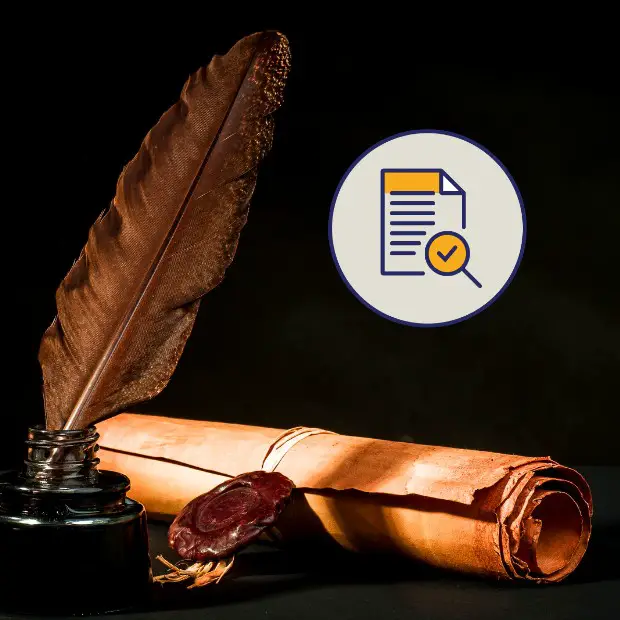
Are you an English literature student who’s not sure about how to format your research paper? Well, don’t fret!
Despite initially appearing to be a daunting task, crafting a research paper in English literature is a rewarding intellectual exercise that can be broken down into manageable sections. Below, you’ll find a quick guide on how to navigate the research paper format for English literature and make sure it sails through submission smoothly.
Here’s the general format of an English literature research paper:
- Title: Make it as specific as possible, and indicate the focus of your research.
- Abstract: It acts as a summary of the research paper, including the research question, methodology, and main findings or arguments.
- Introduction: Here you introduce your topic and provide the relevant background and context. You should present your thesis statement here, outlining the central argument or claim of your paper.
- Literature review and theoretical framework: Review the existing scholarship on your topic and identify gaps or issues that your paper will address. You need to put your paper into a proper academic context and demonstrate why there’s a need for it. This part may also involve setting up a theoretical framework for analyzing your chosen texts. Here, you will be presenting the theories, models, definitions, or existing frameworks that will guide your analysis of the literature.
- Close reading and analysis: This is the heart of your paper, where you analyze your chosen literary works, textual evidence, themes, or concepts in more detail. This analysis should support your thesis statement.
- Discussion: This section involves interpreting your findings, connecting them to your initial thesis statement, and situating them within the broader literary field.
- Conclusion: Summarize your findings and suggest areas for further research.
- Works Cited: Cite all the sources you have referred to in your paper. In English literature, MLA (Modern Language Association) is the commonly used citation style.
Here’s an oversimplified example that uses this formatting framework:
- Title: “The Influence of Ambition in Shakespeare’s ‘Macbeth'”
- Abstract: This paper explores how the theme of ambition drives the narrative of Shakespeare’s tragedy ‘Macbeth’. Using a close reading methodology, it scrutinizes the transformation of Macbeth and the resultant chaos.
- Introduction: This paper investigates the detrimental effects of unrestrained ambition in Shakespeare’s ‘Macbeth’. It argues that ambition leads to the protagonist’s downfall and the destruction of the natural order.
- Literature review and theoretical framework: Previous scholarship has touched upon ambition in ‘Macbeth’, often examining its themes of power and morality. This paper builds upon these discussions, employing a psychoanalytical lens to delve into Macbeth’s internal conflict and his ambition-driven actions.
- Close reading and analysis: Central to this argument is Macbeth’s soliloquy in Act 1, Scene 7, where he contemplates regicide. His ambition, represented as “Vaulting ambition, which overleaps itself” (1.7.27), clearly drives him towards murder, overriding his moral hesitations.
- Discussion: This analysis highlights how ambition, while often perceived as a desirable quality, becomes a destructive force when unrestrained, as depicted in ‘Macbeth’. It reinforces the play’s overarching warning against disrupting the natural order for personal gain.
- Conclusion: ‘Macbeth’ offers a profound exploration of how unchecked ambition can lead to one’s downfall. Further research could consider ambition’s portrayal in other Shakespearean tragedies.
- Works Cited: Shakespeare, William. ‘Macbeth’. The Norton Anthology of English Literature, edited by M. H. Abrams, 9th ed., W. W. Norton & Co, 2012, pp. 293-343.
Please note that you’ll need to into much more depth when crafting your paper.

Composing your paper is pretty straightforward once you’re familiar with the basic building blocks.
What to keep in mind when composing a research paper:
1. Understand the assignment
Before diving into your next paper, take a moment to channel your inner detective and decipher the clues left behind by your professor. Yes, I’m talking about the assignment instructions. Before you groan and roll your eyes, remember that understanding the expectations from the get-go can save you from drowning in a sea of confusion later on. So, whip out your magnifying glass and go full Sherlock on those guidelines. Read carefully, take notes, and make a plan of attack. Trust me, it’s much more satisfying to crack the code early on than to be left scratching your head when the deadline is near.
2. Choose your topic wisely
Choosing a topic for your research paper can feel overwhelming, but it’s also an opportunity to pursue something that genuinely interests you. Don’t be afraid to get creative and select something unique. After all, originality can make your paper stand out in a sea of others. Consider what topics are currently being discussed in your field of study, or perhaps reflect on a question that has always intrigued you. Once you land on a topic, take some time to narrow it down to a specific focus. By doing so, you’ll be able to delve deeper into your chosen subject and provide valuable insights. Have fun exploring your options.
3. Collect information meticulously
Before you start typing, let’s talk about collecting information and evidence. It’s so important to have reliable sources to support any claims you make in your paper. A good place to start is with books and credible websites. However, don’t forget about scholarly journals. These can be a bit more challenging to navigate, but they often contain some of the most valuable information out there. So take some time to gather your sources before jumping into writing. It’ll save you time and stress down the road.
Need help with your research paper?
Coming up with an essay topic or deciding on a research paper format can be challenging, especially when you have several options to choose from. Thankfully, there are plenty of essay writers out there who are ready and willing to lend their expertise to help you make a decision. If you’re feeling stuck, don’t hesitate to reach out and ask for their opinion—it won’t cost you a penny! Plus, these writers have tons of experience in crafting compelling, well-written essays and research papers, so they’ll likely have some great suggestions for you to consider.

Working on your paper presents a great opportunity to dive deep into research and become a true scholar of English literature.
4. Create an outline
Creating an outline is exactly what you need to do next. It’s a simple and effective way to structure your thoughts and present your ideas in a clear and logical format. By breaking down your work into manageable chunks, you’ll find that the writing process becomes much easier and less stressful. Plus, with the help of subheadings, you can easily label and sort your ideas into categories that make sense for your writing. So, don’t stress about the details any longer – sit down, create an outline, and see how it transforms your work into a cohesive masterpiece.
5. Write your paper
Congratulations, you made it to the final stage of writing your paper. It’s time to gather all the research you’ve done and start putting everything together. Remember to refer to your outline and use it as your guide to organize your thoughts. Don’t forget to cite any sources you’ve used within your text to avoid plagiarism. If you come across any difficulties, ask for help or clarification.
6. Proofread and revise
When it comes to writing, proofreading and revising are essential. We’ve all been there; you’re so focused on getting your words on paper that sometimes little mistakes slip through the cracks. That’s why it’s important to set aside some time to go over your work with a fine-tooth comb before submitting it. Take a breather, grab a cup of coffee, and come back to your paper with fresh eyes. Check for spelling and grammar errors, but also make sure everything flows logically. After all, a well-crafted piece of writing can make all the difference. Read it out loud or plug it into one of the free text-to-speech engines and listen carefully for any linguistic missteps you might have missed.
Conclusion
Writing a research paper can seem like an overwhelming task, but you can do it if you eat this literary elephant one bite at a time. By breaking down the process into smaller steps, you can make the entire experience much less challenging. Just provide strong argumentation, ample evidence to back up your claims, and historical and cultural context. Above all, try to bring something new into the conversation instead of regurgitating something that’s been broached by hordes of students who came before you. Next up, you may want to explore a guide on optimizing work productivity.
Hey there, welcome to my blog! I'm a full-time entrepreneur building two companies, a digital marketer, and a content creator with 10+ years of experience. I started RafalReyzer.com to provide you with great tools and strategies you can use to become a proficient digital marketer and achieve freedom through online creativity. My site is a one-stop shop for digital marketers, and content enthusiasts who want to be independent, earn more money, and create beautiful things. Explore my journey here, and don't forget to get in touch if you need help with digital marketing.

